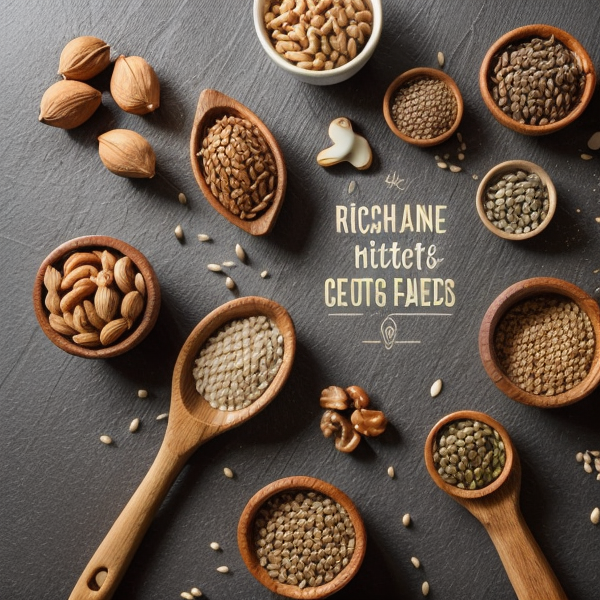Balancing Richness: Nuts, Seeds, and Fats in Vegan Cooking

Title: Balancing Richness: Nuts, Seeds, and Fats in Vegan Cooking
Introduction:
Veganism is not just about avoiding animal products; it’s also about creating delicious and nutritious meals that cater to our taste buds and health needs. While many people assume that vegan cooking lacks flavor and richness, the truth is quite the opposite. With an abundance of plant-based fats, nuts, and seeds, vegans have access to some of the most flavorful and satisfying ingredients available. In this article, we will explore how these powerhouse foods can be incorporated into your vegan diet to create mouthwatering dishes that are both healthy and satisfying.
Nuts and Seeds:
Nuts and seeds are nature’s perfect package when it comes to providing essential nutrients, protein, and healthy fats. They are versatile and can be used in both sweet and savory recipes. Some popular nuts and seeds include almonds, walnuts, cashews, pistachios, chia seeds, flaxseeds, hemp seeds, sunflower seeds, and pumpkin seeds.
Almonds:
Almonds are one of the most commonly consumed nuts worldwide and are a staple in vegan cuisine. They are packed with vitamin E, magnesium, potassium, and fiber. Almond butter has become increasingly popular as a substitute for peanut butter, and can be used in smoothies, on toast, or as a base for sauces and dressings. Try making your own almond milk by blending soaked almonds with water and straining the mixture. You can use this milk in place of dairy milk in recipes like oatmeal, smoothies, and baking.
Walnuts:
Walnuts are another excellent source of omega-3 fatty acids, which are typically found in fish. These essential fats support heart health, brain function, and overall well-being. Walnuts also contain melatonin, a hormone that helps regulate sleep patterns. Add chopped walnuts to salads, stir-fries, or baked goods for a crunchy texture and boost of nutrition. Tahini, made from ground sesame seeds and walnuts, is a popular Middle Eastern condiment that can be used in hummus, dressings, and marinades.
Cashews:
Cashews are a great source of magnesium, copper, and manganese. They are also high in antioxidants, which help protect against chronic diseases. Cashew cream is a popular alternative to dairy-based creams and sour cream in vegan cooking. It can be used as a base for sauces, soups, and desserts. Soak raw cashews overnight and blend them with water to make the cream. Strain the mixture to remove any excess liquid and season with salt, lemon juice, and garlic for added flavor.
Fats and Oils:
In addition to nuts and seeds, there are several plant-based oils that can add richness and depth to your vegan cooking. Avocado oil, olive oil, coconut oil, and nut oils like walnut and almond oil are all excellent choices. When choosing oils, look for cold-pressed, unrefined options that are high in monounsaturated and polyunsaturated fats (MUFAs and PUFAs). These types of fats have been shown to reduce inflammation and improve heart health.
Avocado Oil:
Avocado oil is a versatile oil that can be used for sautéing, roasting, and even frying. Its high smoke point makes it ideal for high-heat cooking methods. Avocado oil is also rich in antioxidants, including vitamin E and carotenoids. Use avocado oil to drizzle over salads, roasted vegetables, or grilled tofu.
Olive Oil:
Extra virgin olive oil (EVOO) is a staple in Mediterranean cuisine and is known for its health benefits. It contains antioxidants, anti-inflammatory compounds, and MUFAs. EVOO has a lower smoke point than avocado oil, so it’s best suited for low-to-medium heat cooking methods. Drizzle EVOO over pasta dishes, brush it onto bread before serving, or use it to make homemade dressings and marinades.
Coconut Oil:
Coconut oil has gained popularity in recent years due to its unique flavor and numerous health benefits. It is high in saturated fats, but these fats are primarily medium-chain triglycerides (MCTs), which are metabolized differently by the body and may offer some health advantages. Coconut oil can be used for baking, sautéing, and even as a skin moisturizer.
Nut Oils:
Walnut and almond oil are both excellent sources of monounsaturated and polyunsaturated fats. They have a higher smoke point than olive oil, making them suitable for high-heat cooking methods. Walnut oil has a more delicate flavor and is best used in dressings and marinades, while almond oil has a slightly sweeter taste and can be used for sautéing and roasting.
Conclusion:
Incorporating nuts, seeds, and healthy fats into your vegan diet doesn’t have to be complicated. By experimenting with different combinations of these powerhouse foods, you can create delicious and nutritious meals that satisfy your taste buds and fuel your body. Remember to balance your intake of these foods with plenty of whole grains, fruits, and vegetables for optimal health.
